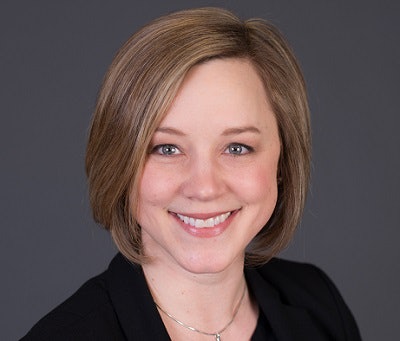How learning outcomes are articulated and assessed are relevant to students, schools and employers, and a whitepaper released Wednesday by Campus Labs analyzed data at the institutional and program levels at two-year and four-year institutions across the nation.
Often missing from national conversations about higher education accessibility and affordability are “concerns about what students will learn, or how they will change as human beings,” according to the report, “Degree of Difference: What Do Learning Outcomes Say about Higher Education?”
 Dr. Shannon LaCount
Dr. Shannon LaCountLearning outcomes should be a basic part of a student’s postsecondary educational experience because they inform students what they will be taught and are expected to learn before leaving a course, a program and an institution, noted Dr. Shannon LaCount, the report’s co-author and assistant vice president for campus adoption at Campus Labs.
While intellectual skills – which encompass reasoning, problem-solving and critical thinking – was the theme with the highest percentage of institutional-level outcomes listed at both types of schools and at the program level at four-year schools, it was second to technology at the program level at two-year schools, the study found.
Intellectual skills and technology, along with culture, communication and personal development, were in the top five at institutional and program-department levels, according to the data, which included 15,521 outcome statements from 73 schools across the United States, all of which use a Campus Labs platform for learning-assessment management.
The data revealed that “there is equity across the institutions, regardless of what school a student wanted to go to,” said LaCount. “That was heartening to me.”
LaCount said the research topic interests her because she is a former educator, having served as an assistant professor and director of student learning assessment at the University of Minnesota Duluth.
“Our intent was to start a conversation about the value of learning outcomes and learning assessment,” said LaCount, who collaborated with Campus Labs enterprise consultant Dr. Matt Jackson on the report. “It begins with what you want students to learn and what you intend for them to learn. Establishing learning outcomes is the first step and probably the most significant step.”
The study found that at the institutional level, a college or university usually sets broader learning outcomes than specific departments or programs, with the former focusing more on broader intellectual and communicative skills and the latter more on informational, technological and career-specific outcomes.
“Campuses more often rely on programs to set it at that level, and then that should complement the institution’s learning outcomes,” said LaCount. “Alignment is perfectly acceptable. If they’re not well-aligned, though, a student might not have an equitable experience. The whole idea is to provide students richer learning experiences.”
The “Outcomes” technological platform provided by Buffalo. N.Y.-based Campus Labs was designed to facilitate the process of developing learning-outcome statements, which in turn supports assessment.
Educators can collect and analyze data without the assistance of that algorithm-informed technological tool, but “it takes a ton of human work and it’s easy to do a bad assessment,” said LaCount.
Postsecondary institutions need to think more about outcomes, and for reasons other than the fact that “accreditors are making them think about assessment,” said LaCount.
“With increased public scrutiny brought upon higher education as a result of scandal, cost and general disagreement about purpose, it is all the more imperative for institutions as a collective to have processes in place that demonstrate what learning happens on campus, and to what end,” she and Jackson concluded in the report. “As niches and name recognition become less reliable drivers of enrollment, institutions will need to differentiate from one another by the uniqueness of what learning outcomes they can provide students.”
Students can be more successful when they get answers to questions about not just what they will learn, LaCount said, but how they will be changed by what they learn.
“We need to more clearly define the value of continuing in school,” she said.
Just because teaching is happening does not mean learning is occurring, so schools must go beyond clearly stating learning outcomes to accurately measuring results, agreed LaCount and Amy Laitinen, director of higher education for New America.
Assessment tends to be “where it all falls apart,” said Laitinen. “It’s sort of a dirty little secret in higher education that they don’t really assess student learning and outcomes. They take it as a given that students are learning.”
Alluding to a 2014 Gallup survey in which 96 percent of chief academic officers said they would give their schools an A+ in terms of equipping students for the workforce but only 11 percent of business owners agreed, Laitinen said it is imperative that learning assessment get more attention on campuses.
“Employers say they’re getting graduates that can’t write, can’t think critically, can’t take information and apply it to a new situation,” she said. “There is a disconnect. Students are borrowing money for this, and they deserve better.”
LaMont Jones can be reached at [email protected]. You can follow him on Twitter @DrLaMontJones





















